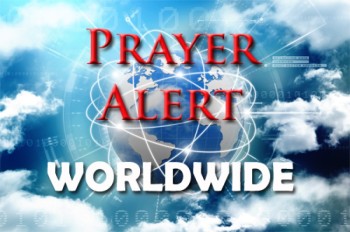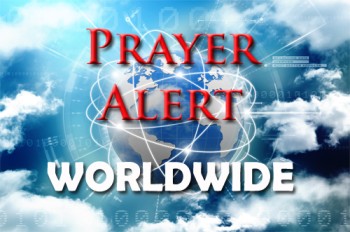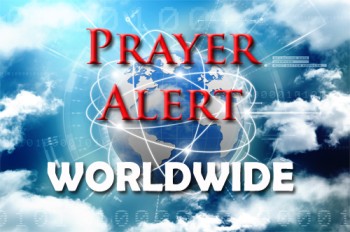Displaying items by tag: Africa
Nigeria: religious freedom
Mubarak Bala, an outspoken Nigerian atheist, was sentenced to 24 years in prison after pleading guilty to blaspheming Islam. The landmark case placed freedom of religion and expression under new scrutiny. A BBC Africa documentary entitled ‘The cost of being an atheist’ revealed the challenges which atheists face regarding freedom of speech and thought. Many disengage from social media activities because emotions and outrage are high. Once people discover someone is not a Muslim, they target them. Despite being a minority atheists face discrimination, harassment and persecution in the Muslim north and also in the Christian south.
DRC: UN troops make ‘strategic withdrawal’
The United Nations peacekeeping mission in the Democratic Republic of the Congo (DRC) has withdrawn troops from the eastern military base of Rumangabo, ceding ground in the battle against the M23 rebel group. M23 resumed fighting and accused the DRC government of failing to honour an agreement to integrate its fighters into the army. The fresh clashes saw the rebel group make advances across North Kivu province. The loss of the key military base is a setback for DRC and a further blow to the security outlook in the conflict-hit east. Thousands remain displaced from the region. Kiwanja’s fall is another humiliation for the government in Kinshasa. It raises serious questions, once again, as to how an extremely small rebellion can do this on their own. UN experts found solid evidence Rwanda had been providing military aid to M23 in eastern DRC. Rwanda’s government has disputed the findings.
Ethiopia: Warring parties agree a ‘permanent cessation of hostilities’
The Ethiopian government and the Tigray People’s Liberation Front (TPLF) have agreed to permanently end hostilities, in a significant step toward ending the grinding war that has seen thousands killed, millions displaced, and millions more in urgent need of food assistance after two years of conflict. Tigray rebels will eventually ‘disarm’ and have agreed on a detailed program of disarmament, demobilisation, and reintegration for the TPLF combatants, taking into account the security situation on the ground. There will be ‘systematic, orderly, smooth and coordinated disarmament, restoration of services, unhindered access to humanitarian supplies, protection of civilians, especially women children and other vulnerable groups.’ The peace process has been fitful until now. The African Union (AU) representative said, ‘This is not the end of the peace process but the beginning of it.’ An AU high-level partner will be tasked with monitoring, supervising and implementation.
Two more former Chibok schoolgirls found
Boko Haram abducted 276 Christian girls from Chibok School in 2014. Girls were whipped and forced into marriage. Some experienced mock executions for refusing to become Muslims. Yana and Rejoice, now young women with children of their own, were among the captives and were recently recovered with their children by the Nigerian Army. Yana Pogu has four children, two boys and twin girls. Rejoice Sanki has two children. They are undergoing medical examinations before being passed over to the care of the Borno government.
Ethiopia: Pray for change
In Ethiopia’s first free and fair election last year, after decades of repressive rule, the Prosperity Party won. However, an opposition boycott and the war in the Tigray region that left many dead and two million people displaced overshadowed the election. Prime Minister Abiy Ahmed has now lifted a ban on opposition parties, released tens of thousands of political prisoners, and is opening up one of Africa’s last untapped markets. Praise God that the Inter-Religious Council has declared a week of prayer. Pray that calls for peace will be amplified on all fronts as the prayers are broadcast on religious and secular television channels and pray that the ethnic battle will stop. Pray that the frightened people will receive encouraging counselling to release their stress and anxieties in productive ways. Pray that in the new regime, multitudes will hear the Gospel and many will accept Jesus Christ as their Saviour. May they be trained to grow in faith through the efforts of the Churches.
Libya: A nation in turmoil
Libya’s government has been unstable for a decade. The situation for Christians changed drastically after Gaddafi’s regime fell. Weapons and Islamist ideologies such as Ansar al-Sharia, Nusra Front, and ISIS began hunting down Christians. The world will never forget ISIS beheading Coptic Christians on Libya’s beach. We praise God that a Christian ministry was able to visit Libya for a week recently and was warmly welcomed as they encouraged many people and shone the bright light of Jesus Christ in this difficult-to-reach nation. Thank God for the global Christian communities and individuals who are praying for the Libyans with love and sympathy. May more avenues be opened for Christians to enter and encourage the persecuted Libyan church. Pray for Christians to gain greater religious freedom to spread the gospel and be able to follow Jesus openly and pray for the believers who are arrested and mistreated because of their faith.
Nigeria: dangers of being religious in a religious nation
Religious intolerance in one of the most religious countries in Africa is dominating debates ahead of next year's elections. It is rare to find anyone not devout in the mainly Muslim north or mainly Christian south. There is no official religion. Although they are guaranteed religious freedom the religious minorities live in fear. ‘We don't have freedom to worship. You are in trouble if you dress like a Muslim. We hide our religion.’ said Ibrahim, a Muslim in southern Nigeria. Obinna Nnadi once lived in the north but felt it was not safe to practise Christianity, so she moved her family south. Islamic law is in place in much of northern Nigeria. Rev Caleb Ahima, vice-president of the Christian Association of Nigeria, acknowledges that religious discrimination is a consequence of location. Meanwhile Odinani, the African traditional religion before Christianity, is making a comeback with younger people who are also facing intolerance and aggression.
Kenya: food crisis
‘Our efforts have been fruitless,’ said a Christian farmer in northern Kenya. ‘Wild animals are invading our farms and eating everything - hippos, elephants, buffaloes. Families have been struggling with nothing to eat.’ This is another problem added to the prolonged drought biting ever deeper. Crops fail, livestock perish, and the all-important water source, the Tana River, dwindles and dries up. Children in northern Kenya have already begun to die of hunger. Barnabas Aid is continuing to feed Christians in that area, where our fellow-believers are a minority and do not get help from the main aid agencies in the area. The rainy season, October to December, is forecast to be short and light across most of the country.
PPE welcomed by Tanzanian health minister
A huge consignment of life-saving personal protective equipment (PPE), shipped to Tanzania through medical.gives, is being deployed to protect health workers from a deadly new Ebola threat. The consignment was welcomed by health minister Ummy Mwalimu and presented by Mags Gaynor, a representative of the Irish government, which donated the equipment. The handover came days after Tanzania was put on alert and health surveillance was stepped up when neighbouring Uganda confirmed 35 infections and seven deaths from a strain of Ebola for which there is no vaccine or drug treatment. Medical masks, gloves, scrubs and other items are being issued to health staff working in areas of Tanzania deemed at the highest risk of an Ebola outbreak. PPE is also being issued to staff helping to combat Covid-19. Fifty million PPE pieces, worth £25 million, have been donated to Christian hospitals in east and southern Africa by the Irish government.
Somalia: brink of starvation
For three decades Somalia has lurched between disorder and anarchy. The government controls only bits of the country. The rest is in the hands of al-Shabab jihadists adept at blowing themselves up in crowded places. For many Somalis life is poor, brutish, and short. They live in the world’s fifth poorest and eighth most violent country. Their life expectancy is the sixth lowest. Droughts and floods add to the misery. In 2011 failed rains contributed to the worst famine of the 21st century: more than 250,000 people died, half of them children. A decade later history may repeat itself. The worst drought in four decades is wilting crops and killing livestock. On 5 September government officials said an even greater catastrophe could sweep the country within days or weeks unless more help arrives. Over 18 million people can’t find enough to eat; children are dying. Pray for hospitals to have enough nutritional supplements for children. See also









